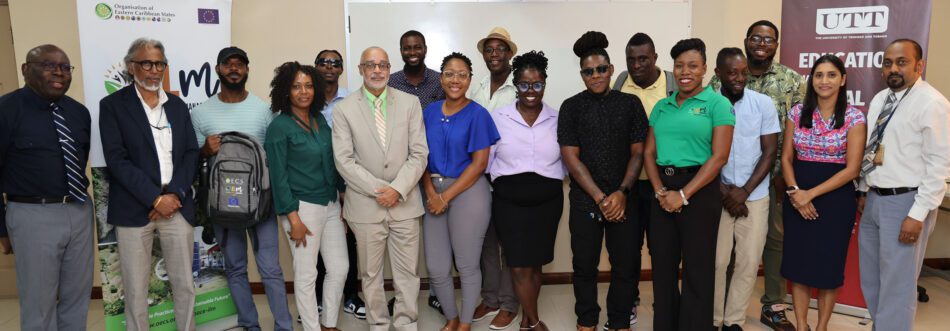OECS Strengthens Regional Capacity in Forests, Parks and Wildlife Management

March 26, 2024 — During the week of March 18 to 22, the Organisation of Eastern Caribbean States (OECS) Integrated Landscape Management (ILM) project team conducted a mission to the University of Trinidad and Tobago (UTT). The mission was aimed at showcasing the OECS Commission’s commitment to 11 OECS students who were recipients of financial support provided through the European Union (EU) funded OECS GCCA Integrated Landscape Management Project. These students, benefiting from complete coverage of tuition, accommodation, stipends, and return flights, are engaged in a two-year diploma program at UTT, focusing on the Conservation and Management of Forestry, Parks, Wildlife, and the Environment. This initiative by the OECS ILM Project aimed to increase the capacities of actors and institutions involved in Integrated Landscape Management and Approaches in OECS Member States. As part of the mission, the 11 students were gifted branded memorabilia kits as tokens of appreciation for their willingness to pursue this training during an award presentation ceremony. The OECS Director General encouraged the students to apply themselves not just to serve their respective countries, but to provide regional capacity and support. He stated:
“We have an obligation to fulfill treaty obligations towards regional integration, economically, politically, and technically in the OECS Region. In addition to the prescriptions of the Revised Treaty of Basseterre, there are frameworks and declarations emanating from requests from Member States. For example, in 1999 Member States requested a framework for Environmental Management and a regional strategy which led to the 2001 St. George’s Declaration of Principles for Environmental Sustainability in the OECS region.
In the rapidly evolving arena of climate change, this Declaration was revised in 2006, and 2010, ultimately leading to the 2020 St. George’s Declaration towards 2040 (SGD2040). An essential component of the SGD is capacity building to create an enabling environment in which Member States and regional institutions can (1) guide and support the processes of sustainable development and (2) set and achieve their individual and collective development objectives. Training is continually embedded in the work of the OECS.”
Mrs. Delamine Andrew-Williams, Senior Technical Specialist for the OECS ILM Project, noted during the ceremony that besides capacity enhancement, the project strives for practical on-the-ground interventions to tackle land use challenges across the nine English-speaking OECS Member States. The project’s strategic output aims to increase awareness and participation at national, regional, and international discussion forums around land use management, seeking to build regional food security, social, and environmental resilience to ongoing threats such as the impacts of climate change and other hazards.
The mission included recording interviews with the students and UTT lecturers from the Agora and ECIAF Campuses, which will be featured in the OECS ILM Project’s inaugural documentary series. The OECS team observed the students during classes on silviculture and mensuration, as well as their laboratory observations and outdoor practicals in forest management techniques, such as tree liberation thinning, wildlife monitoring, and management.
The students, nominated by their respective ILM focal point ministries, include Sheldon Richardson from Anguilla; Lloyd Williams from Antigua and Barbuda; Eddma Wiltshire and Kelvin Felix from the Commonwealth of Dominica; Alex Lambert and Shermaine Augustine from Grenada; Marvin Edward from Saint Lucia; Jason Baker, Jodelia Simmons, and Ray Cecil Charles from St. Vincent and the Grenadines; and Glendon Gregg from the British Virgin Islands.





